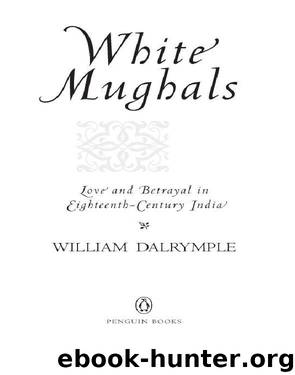White Mughals by William Dalrymple

Author:William Dalrymple
Language: eng
Format: epub, mobi
Publisher: Penguin USA, Inc.
The scale of William’s ambitions has echoes of the world of Conrad, with its steamships, up-country logging stations, ivory hunters, uncharted malarial forests and riverboats. Yet, driven forward with an almost manic energy, it was not long before many of these schemes had been realised: by 1815 William Palmer & Co. had grown to be the richest and most important commercial operation in the subcontinent outside British-controlled India; it also ended up bankrolling the Nizam and ‘acquired an ascendancy over the Minister that rendered him a creature of their will’.43
In many ways William Palmer can be said to have brought nineteenth-century Western entrepreneurial capitalism to the late-Mughal world of the Deccan; but what is remarkable is that he did so in a way that was not entirely Western, and which was certainly quite independent of the East India Company. He used local bankers and, mostly, local money, and seems to have operated, at least partly, according to traditional Indian modes of doing business. Moreover, he sought influence and gained patronage by using time-honoured Mughal techniques of giving gifts and seeking favours from his mother’s friends in the Nizam’s zenana: according to a later British Resident, if William met any opposition to his plans, ‘the Women of the Palace would be brought over to favour the application’. 44
In 1802 this all lay in the future. But throughout the time William was establishing himself in Hyderabad, he had continued to live the hybrid Anglo-Mughal lifestyle which had been such a distinguishing mark of his parents’ home. His house in Hyderabad gradually became a celebrated gathering place where the British and Hyderabadis met on equal terms. A revealing portrait of his domestic arrangements is given by an anonymous English traveller who visited him there in about 1810:I passed one morning and took tiffin with a famous English merchant, who holds a singular sort of durbar every morning at which you may see shroffs [moneylenders] and merchants, officers and nobles, coming to beg, borrow, lend or transact business; all of which is done according to native customs. These Mr. P observes in everything connected with his establishment; even when alone, sitting on the floor to a dinner served in their fashion; reading the Arabian nights with his Moorish wives; presiding at nautches; and (de gustibus non est disputandum) listening with pleasure to the musical sound of the native tom-tom.
He is a man of uncommon talent and great information—very popular among the natives of course, and with the British also, for his liberality, ready and obliging politeness, and unbounded hospitality to all: to the poor man also he is very charitable. The choice of an Eastern mode of life is with him not altogether unnatural. He was born of a native mother, a female of Delhi of good descent.45
Download
This site does not store any files on its server. We only index and link to content provided by other sites. Please contact the content providers to delete copyright contents if any and email us, we'll remove relevant links or contents immediately.
China Rich Girlfriend by Kwan Kevin(4558)
The Silk Roads by Peter Frankopan(4526)
Annapurna by Maurice Herzog(3464)
Full Circle by Michael Palin(3443)
Hot Thai Kitchen by Pailin Chongchitnant(3381)
Okonomiyaki: Japanese Comfort Food by Saito Yoshio(2715)
The Ogre by Doug Scott(2679)
City of Djinns: a year in Delhi by William Dalrymple(2554)
Photographic Guide to the Birds of Indonesia by Strange Morten;(2532)
Vietnam, Cambodia, Laos & Northern Thailand by Lonely Planet(2455)
Tokyo by Rob Goss(2427)
Tokyo Geek's Guide: Manga, Anime, Gaming, Cosplay, Toys, Idols & More - The Ultimate Guide to Japan's Otaku Culture by Simone Gianni(2367)
Everest the Cruel Way by Joe Tasker(2338)
Discover China Travel Guide by Lonely Planet(2222)
Iranian Rappers And Persian Porn by Maslin Jamie(2196)
China (Lonely Planet, 11th Edition)(2160)
China Travel Guide by Lonely Planet(2147)
Lonely Planet China(2141)
Top 10 Dubai and Abu Dhabi by DK Travel(2097)
